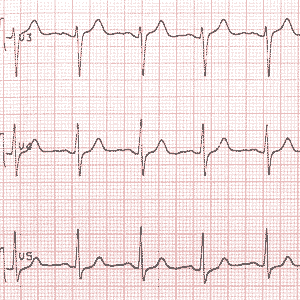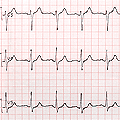Description of the test
An electrocardiogram (ECG) is a test that records the electrical activity of the heart. It is useful for diagnosing abnormalities of the heart including heart attacks, abnormal heart rhythms, and other heart conditions.
How often should the test be performed?
Your doctor will decide when and how often this test is required.
Why is this test performed?
The ECG records the underlying rate and rhythm of the heart. It may be performed as part of the routine physical exam or for an exercise stress test. It may also be performed when people have risk factors for heart disease (e.g., diabetes or high blood pressure), to check the health of the heart.
ECGs are used if you have symptoms of a heart attack or heart disease (such as chest pain, shortness of breath, or palpitations). They help to identify damage to the heart muscle or enlargement of the pumping chambers of the heart.
In addition, this test can also be used to monitor the effectiveness of heart medications or devices, such as a pacemaker.
Are there any risks and precautions?
This test is safe. There is no known risk of side effects or complications.
An allergic reaction to the stickers is possible, but rare.
What happens during the test?
During an ECG, small electrodes (called "leads") will be placed on your wrists, ankles, and chest. Older machines require a small amount of gel applied to the skin, which allows the electrical impulses of the heart to be more easily transmitted to the ECG leads, while newer machines just use special stickers. Shaving a small amount of hair from the skin (usually chest hair on men) may also be necessary to improve the contact between the lead and the skin. You will be asked to stay still and to hold your breath or breathe softly.
The leads pick up tiny electrical currents that flow through your heart. The electrical signals are carried from the leads to the ECG machine, which converts the signals into patterns of waves. ECG waves show the heart's rate and rhythm, and they can give doctors clues about potential heart damage. The ECG machine produces a print-out, which is given to the doctor.
The ECG can be performed in a doctor's office or at the bedside in a hospital. The entire test takes just a few minutes.
If you have chest pain during the test, tell the technician or the doctor. This information is useful when the doctor interprets the test results.
How should I prepare for this test?
Tell your doctor or prescriber about all prescription, over-the-counter (non-prescription), and herbal medications that you are taking. Also tell them about any medication allergies and medical conditions that you may have.
Ask your doctor or pharmacist whether you need to stop taking any of your medications before the test. Certain medications affect your heart and can influence the patterns of ECG recordings.
No special preparations are necessary, however drinking cold water or exercising immediately before an ECG should be avoided unless otherwise instructed.
What can I expect after the test?
You can return to your normal activities after the ECG has been completed. Call your doctor if you have heart-related symptoms which worsen.
Results
Your cardiologist or family doctor will analyze the patterns of waves on the ECG print-out and will discuss the test results with you. Each chamber of the heart has its own unique pattern, so doctors can see if a certain area of the heart is producing abnormal electrical signals.
An ECG may be used to record the electrical activity of your heart while you're at rest or while exercising (this is called an exercise stress test). Exercise stress tests are done to detect heart disorders that occur when the heart is working harder than normal.
Depending on the test results, your doctor may have follow-up information for you. Make sure to ask any questions you have about the results of your ECG.
All material copyright MediResource Inc. 1996 – 2024. Terms and conditions of use. The contents herein are for informational purposes only. Always seek the advice of your physician or other qualified health provider with any questions you may have regarding a medical condition. Source: www.medbroadcast.com/procedure/getprocedure/ECG

An electrocardiogram






